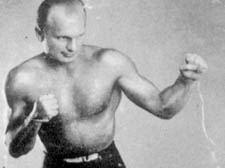|
|
 |
| |

Edmond Kas in his boxing heyday in the 1920s, and at his home in Dartmouth Park |
Fighting to scale walls of a ghetto
Former boxing champ Edmond Kas, who turned 100 last week, tells Dan Carrier how he defied the Nazis by helping Budapest’s Jews during the 1940s
THEY had walked in complete silence for 30 kilometres through the night, leaving behind friends, family, homes businesses. They had reached a crest of a hill and there before them, on the other side of a wide but shallow river, was the west.
It was late 1956, and Edmond Kas and his young family had decided they had had enough: they had survived the Nazi occupation of their country, but when Soviet tanks rolled in to quash a student led revolution, they left Budapest and trekked to Austria with 100 others.
But as they approached the border, soldiers appeared from nowhere. They fired their rifles in the air and told them their journey was over and they would be arrested.
Edmond Kas, who celebrated his 100th birthday last week, was ready to turn around. Then a remarkable act of bravery meant the former champion boxer and war hero made it to Austria.
“A woman with a baby in her arms walked forward,” he recalled.
“She said to the soldiers: I am not turning round. I am going to wade over the river and go on. You will have to shoot me and my baby to stop us.”
The group followed and Mr Kas and his family left the turmoil of Europe behind for a new life in Australia.
Edmond, who lives in sheltered housing in Dartmouth Park, returned to Europe in the late 1970s after retiring.
His life has seen him bear witness to the horrors of totalitarianism – and meant he has had to follow his conscience to stand up to two violent political regimes.
Born in 1909 in the Hungarian countryside, his father William was a chemist. He had developed a health tonic using local spring water and encouraged his 11 offspring to live an outdoor life.
Edmond joined a boys club and spent his teens boxing. He quickly showed an aptitude for the sport and won title after title. His father had nurtured a love of mountaineering in him and he joined The Nature Lover’s Association, which organised weekend treks.
“I love nature,” he recalls.
“I took my children up the mountains and taught them to respect wild flowers – never to pick them.” He also asked his family and friends who accompanied him on trips to keep their noise to a minimum so they could really appreciate the sounds of the mountains.
“When you climb, you should do it in silence so you can hear the birds,” he said.
He also recalls the camaraderie of climbing, of reaching a summit with your friends.
“I loved sharing meals out in the open air,” he recalls.
As well as boxing, Edmond trained as a master craftsman, making handbags and purses. This gave him a business to fall back on as the dark spectre of Nazism swept across the continent.
“The 30s were of course a terrible time across Europe, but times were not so hard in Hungary, which remained prosperous,” he recalls.
He spent much of his time travelling around Europe fighting in boxing bouts, winning championship after championship. The array of medals on display in his room are testimony to the punch he packed and the mean chin he carried.
But it was when war broke out that Mr Kas showed another side of his bravery.
Regardless of the danger to himself, he decided he could not sit by and watch Jewish people and others be murdered by Nazis.
He travelled through the Hungarian and Romanian countryside and asked non-Jewish farmers if he could have their identification cards and other official documents. He knew they could easily get replicas – and if the cards were handed on to people in danger, they could save lives.
He also took it upon himself to make regular under-cover runs with food supplies into the Jewish ghetto in Budapest to help its inhabitants stave off starvation.
At that time Hungary was an ally of the Nazis.
Now, as he enjoys a week of parties to celebrate reaching the milestone of 100, Mr Kas looks back and says he simply did what he had to do.
“They were hungry, so I helped feed them,” he said.
“They were in danger, so I did what I could to make them safe.”
And his secret to a long life?
“Never smoke, don’t drink, and sleep well,” he says.
“And try to tell a joke a day. Love and laughter keeps you going.” |

|
 |
Your comments:
|
|
 |
|

